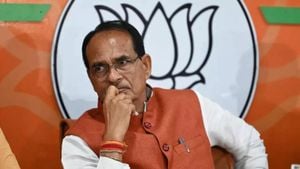Pullela Gopichand's recent remarks on the state of sports and socioeconomic disparity have ignited discussions among parents and aspiring athletes across India. The national badminton coach stirred controversy by arguing against middle-class families encouraging their children to pursue serious sports careers, stating, "Don't play sport seriously if you’re from the middle class." Gopichand’s assertions, initially highlighted by The Indian Express, reflect deep concerns about the opportunities available to athletes once their competitive days are over.
Gopichand's comments arose during interviews where he expressed his worries about the lack of alternative career pathways for athletes who may not achieve elite status. "Being in sport has been a long, difficult path for many, especially when they see players across various disciplines sacrificing their education for sports full-time," Gopichand stated. He pointed out, too, the difficulties faced by even those who escalate to high levels, like Olympic medallists, who often end up struggling for respect and jobs within the 'sports quota' offered by government sectors.
The former All England champion lamented instances when players approach him, asking about job opportunities, which he finds disheartening. He recalled the stories of athletes like Treesa Jolly and Tanisha Crasto, who, after significant efforts and national recognition, still find themselves questioning their job prospects.
Gopichand stated, "Year on year, parents across sports are deeply committed but don't fully realize the grim realities. If even top players are struggling for jobs, something is wrong with the system. For middle-class parents, investing everything they have with hopes of their child becoming another Sachin Tendulkar or P.V. Sindhu is unwarranted risk-taking. It’s hard to dissuade them, but they have to be rational about it."
His remarks have stirred controversy, as they raise uncomfortable truths about the harsh realities faced by athletes, particularly those of humble backgrounds. Gopichand's earlier wording suggested middle-class children should think carefully before pursuing sports, echoing the sentiment, "If you come from a very poor family, you will throw everything at sports because it's all or nothing. If you’re wealthy, you have something to fall back on." For families seeking financial security, pushing children toward sports becomes more of a gamble.
Yet, Gopichand emphasized the importance of education, saying, "I totally say education needs sport, because students are struggling under academic pressures, and for mental health reasons, sports can help relieve this stress. Concurrently, sport needs education to be viable long-term." He advocates for structured talent identification, saying it’s key for the growth of athletes and for preventing those who lack potential from wasting pivotal years.
Nithin Kamath, co-founder of Zerodha, provided his own perspective on Gopichand’s comments through social media, sparking even more engagement from the public. He expressed, "While I understand Gopichand's concern, I have a different view." Kamath acknowledged the substantial challenges athletes face but underscored the expansion of opportunities beyond just competing—like coaching, sports science, and entrepreneurship. He asserted, "If someone is passionate about sports, even if they fail to become professionals, today there are innumerable career alternatives available. You can pursue coaching or personal training. The demand for those roles is at its peak."
Kamath's response was met with mixed feelings, reflecting broader discussions about the changing nature of careers driven by passion, not purely by traditional views of sports stability alone. He addressed the importance of pursuing something one enjoys for long-term fulfillment and job security, especially as the world evolves technologically. He stated, "The odds are you may end up performing below average if you’re stuck doing something you dislike, and with the AI-driven world upon us, this makes pursuing one’s passion even more urgent."
This conversation around socioeconomic status and sports was echoed by other community members, who reiterate the notion of pursuing passions without the specter of financial burdens looming large over them. Discussions online pointed to changing societal values where financial stability becomes intertwined with individual satisfaction and success.
Many supported Kamath’s view, reflecting on the current stage of the sports industry and its potential to evolve. Amidst the criticism Gopichand faced, it was his underlying concern for the future of aspiring young athletes which prompted this debate, as he contended, "The country must embrace education and sport as interconnected paths, supporting athletes through their careers by ensuring they have viable alternatives and respect, no matter what achievements they attain on the field."
The discourse surrounding Gopichand's comments and Kamath's rebuttal speaks volumes about the urgent need for systemic change for young athletes. Parents seeking to guide their children toward fulfilling careers might now weigh traditional beliefs against rapidly changing societal norms, asking difficult questions about where passions can truly lead.



